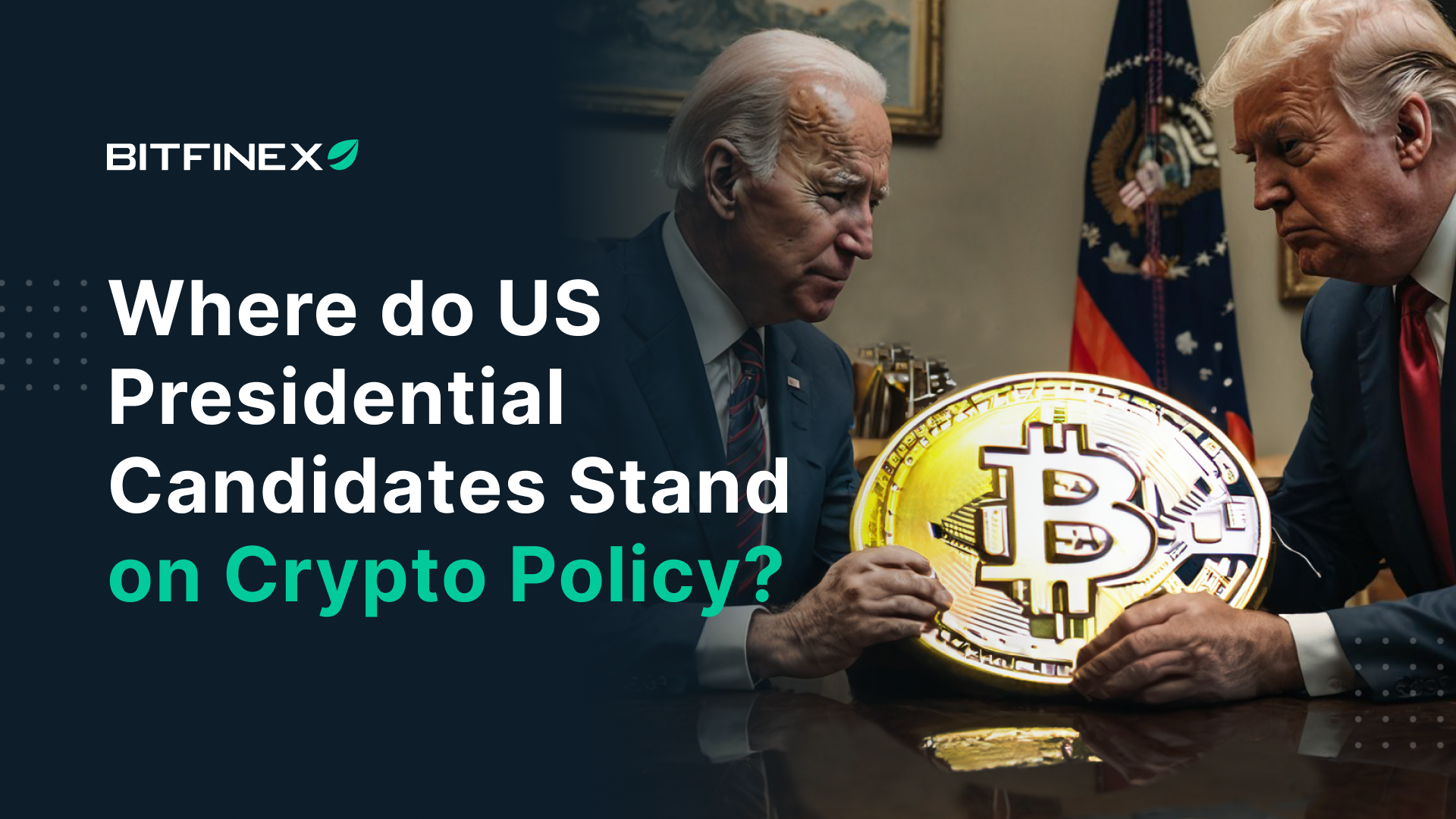Regulation
Where do US Presidential Candidates Stand on Crypto Policy?

12 Jul Where do US Presidential Candidates Stand on Crypto Policy?
Posted at 15:12h
in Education
by admin
In the 2024 United States presidential election, cryptocurrency has emerged as a pivotal issue influencing voter decisions and political campaign strategies. A significant portion of the electorate prioritises the stances on digital assets taken by each candidate, with many advocating for clear regulatory frameworks to foster industry growth. Major crypto firms are investing heavily in political campaigns to support pro-crypto candidates, particularly in key Senate races, highlighting the industry’s growing political clout. The election’s outcome could significantly impact the future of crypto regulation and the U.S.’s role in the global digital economy.
Crypto Emerges as an Important Issue in the 2024 Presidential Election
In our prior article, “Has Bitcoin Become Political?”, we speculated on the prospect of crypto becoming an important topic in critical political discourse. In the 2024 United States presidential election, cryptocurrency has become a significant and polarising issue. As millions head to the polls in November, the stance of candidates on digital assets is proving to be a major consideration for a substantial portion of the electorate. This shift is driven by the increasing adoption and integration of crypto into daily life, making it a relevant topic for many voters. The rise of the crypto vote reflects a broader trend where digital assets and the principles of decentralisation are becoming central to political discussions.
A recent poll by the National Crypto Council revealed that around 80% of respondents consider a candidate’s position on cryptocurrency to be at least somewhat important to their vote. This highlights the growing importance of crypto policy in the political arena. Incredibly, 83% of crypto voters expressed a preference for candidates who support clear regulatory frameworks to foster industry growth and investor protection. This sentiment underscores the dissatisfaction with the current financial system and the desire for reform that many see as achievable through the adoption of cryptocurrencies.
The emergence of crypto as a political issue is not confined to voter preferences. The industry itself has become a formidable player, investing heavily in political campaigns and lobbying efforts. Major crypto firms like Ripple, Coinbase, and Andreessen Horowitz have pooled substantial resources to support pro-crypto candidates, regional Senate races. This strategic spending aims to influence policy and secure a favourable regulatory environment for the future of digital assets in the United States.
The 2024 election is shaping up to be a defining moment for the crypto industry. The differing attitudes of candidates towards digital assets could have far-reaching implications for the industry. A supportive administration could drive innovation, attract investment, and establish the U.S. as a leader in blockchain technology. On the other hand, restrictive policies might stifle growth and push the industry to more welcoming jurisdictions, abroad. As the political landscape evolves, the role of cryptocurrency in shaping the future of the U.S. economy and its position in the global digital assets economy cannot be overstated.
Where Do the Most Popular Presidential Candidates Stand on Crypto?
Joe Biden
The Biden administration’s approach to the crypto industry has undergone a notable shift as the 2024 election approaches. Initially characterised by a heavy-handed regulatory stance, exemplified by actions like the proposal of a Digital Asset Mining Energy (DAME) excise tax and aggressive enforcement by the SEC against major exchanges and blockchain projects, the administration appeared intent on curbing the growth of the crypto sector. This tough line was part of a broader strategy to ensure that cryptocurrencies did not undermine financial stability, protecting investors by imposing strict regulations and discouraging mainstream financial institutions from engaging with crypto assets.
However, the narrative began to change as former President Donald Trump openly embraced the crypto industry, positioning himself as a pro-crypto candidate. This move by Trump forced the Biden administration to reconsider its stance, leading to a noticeable softening in rhetoric. For instance, the SEC’s potential approval of spot Ethereum Exchange-Traded Funds (ETFs) and other positive regulatory developments indicated a shift towards a more crypto-friendly approach. This change in tone was likely influenced by the need to appeal to the growing number of crypto enthusiasts and investors who view digital assets as a significant issue in the upcoming election.
Despite the softer rhetoric, the Biden administration’s past actions reflect a tendency that some critics say are aimed at stifling the crypto industry through measures like Operation Choke Point 2.0. This initiative aimed to limit the industry’s access to traditional financial services, creating barriers for crypto businesses to operate within the established banking system. Such policies have led to accusations of bias and a deliberate attempt to hamper innovation in the crypto space, creating a complex regulatory environment that has been challenging for the industry to navigate.
As the election draws nearer, the Biden administration’s recent outreach to the crypto community and participation in discussions around crypto policy suggest a strategic pivot. This shift aims to counter Trump’s pro-crypto stance and regain the support of crypto voters. While some in the crypto industry welcome this change, others remain sceptical, viewing it as a politically motivated move rather than a genuine commitment to fostering a supportive regulatory framework for digital assets. The ongoing debate and policy developments will play a crucial role in shaping the future of crypto regulation in the United States, reflecting the high stakes of the 2024 presidential election for the crypto industry.
Donald Trump
David Bailey, the CEO of Bitcoin Magazine, has taken a prominent advisory role in Donald Trump’s campaign, aiming to shape the former president’s cryptocurrency policy. Bailey’s influence has led Trump to adopt a pro-crypto stance, marking a significant shift from his earlier scepticism. This move is largely seen as a direct response to the Biden administration’s stringent regulatory measures against the crypto industry, which many in the crypto community view as hostile and overbearing. Bailey’s strategy includes advising Trump to sign a comprehensive crypto-focused executive order on his first day in office, signalling a strong commitment to fostering a crypto-friendly environment in the U.S.
Trump’s newfound support for the crypto industry extends to the mining sector, where he has pledged to champion Bitcoin mining both domestically and on the global stage. In a meeting with major Bitcoin miners and industry leaders, Trump expressed his desire for the U.S. to become a dominant force in Bitcoin mining, emphasising the potential for energy independence and economic growth. This stance is a stark contrast to President Biden’s approach. Trump’s pro-mining rhetoric has resonated strongly within the crypto community, garnering significant support from industry leaders.
In addition to his policy proposals, Trump has actively engaged with the crypto community, even addressing the Libertarian National Convention, where he reiterated his support for digital assets and said he would free Silk Road creator Ross Ulbricht, if elected. Trump has also pledged to halt the development and implementation of Central Bank Digital Currencies (CBDCs), which are widely unpopular among crypto users who view them as a threat to financial privacy and decentralisation. This move has solidified his position as a pro-crypto candidate, appealing to a demographic that values financial freedom and innovation in the digital assets industry. Trump’s promise to halt the current administration’s regulatory crackdown and implement policies that encourage technological advancement has struck a chord with many crypto enthusiasts. However, scepticism remains among some crypto voters who question the sincerity of his commitment, given his prior negative statements about cryptocurrencies.
Despite the mixed reception, Trump’s pivot towards a pro-crypto agenda has undeniably made cryptocurrency a significant issue in the 2024 presidential campaign. His efforts to align with the crypto community contrast sharply with Biden’s regulatory approach, positioning Trump as a potential advocate for the industry. As the election draws nearer, the crypto community’s support could prove pivotal, especially as Trump continues to emphasise the importance of fostering innovation and positioning the U.S. as a leader in the global digital economy.
Robert F. Kennedy Jr.
Independent presidential candidate Robert F. Kennedy Jr. has emerged as a significant pro-crypto contender, appealing particularly to independent voters and those disenchanted with Trump & Biden’s policies. Kennedy has consistently highlighted his commitment to Bitcoin and blockchain, positioning himself as a unique advocate for digital assets in the presidential race. His campaign promises include innovative plans like placing the entire U.S. budget on the blockchain to ensure transparency and accountability in government spending. He envisions a system where every American can scrutinise budget items at any time, aiming to foster a new level of public oversight and trust.
Kennedy’s pro-crypto stance extends to his opposition to Central Bank Digital Currencies (CBDCs). He has been vocal about the risks associated with CBDCs, arguing that they could lead to increased government surveillance and a loss of financial freedom for individuals. Instead, Kennedy supports backing the U.S. dollar with Bitcoin, aiming to stabilise the currency and integrate it with emerging digital assets. His proposals resonate with many crypto enthusiasts who seek a candidate willing to challenge the status quo and promote innovation in the financial sector.
Robert F. Kennedy Jr. has proposed an ambitious tax-free crypto policy aimed at promoting the broader adoption of Bitcoin and enhancing financial freedom. His plan involves exempting Bitcoin transactions from capital gains taxes, thereby eliminating a significant barrier for users who wish to use Bitcoin as a regular transactional currency rather than merely a speculative investment. This policy is part of Kennedy’s broader vision to integrate cryptocurrencies into the mainstream financial system, providing a robust alternative to traditional fiat currencies. By removing the tax burden on Bitcoin transactions, Kennedy believes it will encourage more people to engage with digital currencies, ultimately fostering innovation and positioning the United States as a global leader in the crypto economy.
Throughout his campaign, Kennedy has actively sought the support of the crypto community by attending major industry events and engaging directly with crypto users. He has spoken at conferences like Consensus 2024, where he emphasised his commitment to protecting transactional freedom and ensuring the U.S. remains a hub for blockchain innovation. His efforts have garnered significant attention and support from those who prioritise financial autonomy and transparency, though not all crypto voters are fully convinced of his sincerity or the feasibility of his plans.
Despite the enthusiasm, Kennedy’s campaign has faced scrutiny, particularly regarding his personal investment in Bitcoin. After initially claiming not to be an investor, financial disclosures revealed that Kennedy had purchased a substantial amount of Bitcoin. This revelation raised questions about potential conflicts of interest and the timing of his investments. While Kennedy’s campaign clarified that the investment was made after his initial statements, the incident has added a layer of complexity to his pro-crypto narrative, leaving some voters sceptical of his true intentions.
Will Crypto Have a Significant Impact on the Election Results?
The emergence of cryptocurrency as a significant political issue in the 2024 election has introduced a new dimension to the campaign landscape. The leading candidates have each taken varied stances on crypto, reflecting the growing importance of digital assets in the national economy. This development has particularly resonated with a youthful segment of tech-savvy and digitally native voters, making it a topic of considerable debate. However, the true extent of its influence on voter turnout and decision-making remains uncertain. While some segments of the population, especially those deeply invested in the crypto ecosystem, may be swayed by these discussions, it is still unclear whether this issue will mobilise a broader voter base.
As the election date of November 5, 2024, approaches, political analysts and campaign strategists are keenly observing how the crypto debate unfolds. The differing positions of candidates like Biden, Trump, and Robert F. Kennedy Jr., contrast sharply with more cautious or adversarial views from each contender appealing to a unique demographic of potential voters. This divergence creates a dynamic electoral environment where the crypto issue could potentially tip the scales in closely contested regions. Nevertheless, with many other pressing issues also at play, the impact of cryptocurrency on the overall electoral outcome is difficult to predict.
Watching the events leading up to the election will be particularly fascinating for observers and participants in the crypto space. The interplay between traditional political concerns and this modern financial innovation could set new precedents for how emerging technologies influence democratic processes. Regardless of the ultimate influence on voter behaviour, the inclusion of cryptocurrency as a political issue highlights its growing relevance and the necessity for policymakers to address it comprehensively. As the election nears, the crypto community and the wider electorate will be closely monitoring candidate positions and policy proposals, eager to see how this debate shapes the future of digital finance and governance in the United States.
Regulation
South Korea Moves to Delay Cryptocurrency Tax Until 2028 Amid Market Concerns

South Korean lawmakers have proposed a bill to delay the tax on cryptocurrency earnings until 2028.
The ruling political party proposed the bill on July 12, citing current negative sentiment around the cryptocurrency sector as the reason for the extension. declared:
“With investor sentiment toward virtual assets deteriorating, some argue that hasty taxation of virtual assets is not desirable at this time, as virtual assets are high-risk assets with a higher risk of loss than stocks, and if income tax were also imposed, it is expected that most investors would abandon the market.”
South Korea had originally planned to implement its cryptocurrency earnings tax on January 1, 2025. However, if the new bill is passed, the implementation date will be moved to January 1, 2028. The subcommittee met on July 15 to continue the review.
The move is in line with President Yoon Suk-yeol’s campaign promisesHe assured voters that he would extend the cryptocurrency earnings tax during the last general election if elected. His administration aims to create a clear regulatory framework before implementing the tax.
However, the Ministry of Economy and Finance has not yet decided on the postponement. The ministry plans to announce new amendments to the fiscal policy by the end of the month.
“No decision has been made on further postponing the implementation of taxation of income from virtual activities,” a ministry spokesperson said. She said.
South Korea’s Thriving Cryptocurrency Industry
South Korea is one of the fastest-growing countries in the world in adopting this emerging sector.
In the first quarter of this year, blockchain platform Kaiko reported that the Asian country’s national currency, the Won, emerged as the leading currency for global cryptocurrency trading, with a cumulative trading volume of $456 billion across centralized exchanges.
Furthermore, the Asian country is a shining light for its proactivity approach to cryptocurrency regulationSouth Korea has implemented different rules designed to improve consumer protection standards for cryptocurrency users in its jurisdiction.
Latest stories from South Korea
Regulation
ESAs consult on guidelines for cryptocurrency regulation

THE European Supervisory Authoritiesincluding EBA, EIPA and ESMA, have published a consultation paper on guidelines under the Markets in Cryptocurrencies Regulation (MiCAR).
In doing so, the ESAs intended to develop templates for legal explanations and opinions regarding the classification of cryptocurrencies along with a standardized assessment to support a common approach to classification. In addition, the current move is intended to assist market participants and supervisors in accommodating a standardized test while receiving legal explanations and opinions that provide descriptions of the regulatory classification of cryptocurrencies in different cases. Among them, the ESAs mention:
-
Asset-Referenced Tokens (ART), whose white paper for their issuance must be accompanied by a legal opinion that highlights the classification of the crypto-asset, especially with regard to the fact that it is not an electronic money token (EMT) or a crypto-asset that could be excluded from the scope of MiCAR;
-
Cryptocurrencies that are not considered ART or EMT under the Regulation, for which the white paper must be accompanied by an explanation of the classification of the cryptocurrency, in particular information that is not an EMT, ART or a cryptocurrency are excluded from the scope of MiCAR.
As part of the press release, the ESAs mention that the consultation paper can be submitted directly from the consultation page, with a deadline for submissions of 12 October 2024. After holding a virtual public hearing on the consultation paper on 23 September 2023, the authorities are ready to publish all contributions, unless otherwise requested.
Background
In an effort to establish a framework for the provision of crypto-asset services, MiCAR develops regimes to regulate the issuance, supply to the public and admission to trading of EMT, ART and other crypto-assets. The draft was created under Article 97(1) of MiCAR, which requires authorities to jointly provide by 30 December 2024 the Guidelines pursuant to Article 16 of the ESA Regulations (EU Regulation) No. 1093/2010 Regulation 1094/2010, Regulation 1095/2010) to specify the content and form of the explanation accompanying the white paper on crypto-assets referred to in Article 8(4) and the legal opinions on the qualification of asset-referenced tokens (ARTs) referred to in Article 17(1), point (b)(ii) and Article 18(2), point (e) of MiCAR.
In addition, ESAs are required to include in the Guidelines a model for explanation and opinion and a standardized test for the classification of cryptocurrencies. At the time of the announcement, this was the only joint policy mandate of ESAs developed under MiCAR.
Regulation
Cryptocurrency News Today – July 15, 2024

Welcome to “Crypto News Today”, your daily digest of the cryptocurrency industry.
Bitcoin ETFs surge amid price recovery, market fluctuations
Bitcoin ETFs have seen their best weekly inflows since May, with $882 million in the week ending July 11. Bitcoin’s price has recovered to around $62,000, up 15% from its recent low, reflecting renewed investor interest and market optimism. To learn more, visit the TDR website!
Bitcoin Surpasses Leveraged ETFs
Bitcoin’s price has outperformed risky leveraged ETFs like BITX and BITU, demonstrating the cryptocurrency’s relative stability in a volatile market. Investors are increasingly favoring direct Bitcoin holdings over complex financial products.
SEC Closes Investigation into Hiro Systems
The SEC has concluded its three-year investigation into Stacks developer Hiro Systems without taking any enforcement action. The move brings relief to the company and its shareholders, potentially increasing confidence in the Stacks ecosystem.
Genesis Transfers 760 Million BTC to Coinbase
Amid a market sell-off, Genesis advanced $760 million in Bitcoin to Coinbase. The large transfer has raised speculation about potential trading strategies or liquidity by the digital asset company.
JP Morgan-Backed Partior Closes $60M Series B
JP Morgan-backed blockchain firm Partior has successfully closed a $60 million Series B funding round. The funds will support Partior’s mission to simplify cross-border payments and advance blockchain-based financial solutions.
Cryptocurrencies Become The Theme of 2024
Cryptocurrencies have emerged as a key issue in the 2024 political landscape, with parties and candidates debating regulation, innovation, and the future of digital currencies. This trend underscores the growing importance of cryptocurrencies in economic and political discussions.
Read more cryptocurrency news on the TDR website!
Regulation
How Cryptocurrency Firms Are Capitalizing on MiCA’s Bumpy Launch – DL News

- The MiCA licensing regime will come into force at the end of December.
- Levels of severity vary from country to country.
- This will create opportunities for companies to engage.
Stablecoin laws have already come into force, but EU countries are rushing to comply with the rest of the Union’s new cryptocurrency regulation before the deadline.
The EU regulatory framework requires cryptocurrency businesses such as exchanges to choose a country in which to apply for a license. In practice, countries will inevitably have different levels of stringency.
The Markets in Crypto-Assets regulation is designed to introduce a level playing field across the EU, as national regulators will have to adhere to the same set of standards. Once licensed, crypto-asset service providers, or CASPs, can move their services anywhere in the bloc.
Additionally, countries are allowed to opt for longer transition periods before enforcing the MiCA rules. This is known as the grandfathering period.
All of this could call into question the level of compliance in some countries.
— Ernest Lima, XReg Consulting
That creates opportunities for cryptocurrency firms to seek out jurisdictions with lighter rules and less enforcement, said Ernest Lim, a partner at consultancy XReg. DL News.
“Cryptocurrency companies registered or licensed in different EU member states may be subject to different requirements” between January 2025 and July 2026, Lima said.
Due to time and capacity constraints, some local regulators may have difficulty processing applications in time for the deadline, he added.
“Some may not even have sufficient resources to adequately supervise licensed CASPs,” Lima said.
Join the community to receive our latest stories and updates
“All of this could call into question the level of compliance in some countries.”
Companies are already exploiting the patchy way MiCA regulations are enforced in the EU, in a practice known as regulatory arbitrage, Lima said.
Just the beginning
MiCA’s stablecoin laws went into effect on July 1st, marking the start of the launch.
The next stage is the MiCA licensing regime for cryptocurrency businesses, including exchanges, custodians and investment firms, which will come into force on December 30.
Although the new rules will be stricter, CASPs registered in one country will be able to offer their services throughout the EU27 under the MiCA ‘passporting’ provisions.
Some countries with simpler registration requirements already have significant numbers of VASPs on their registers.
Lima said he expects the number of CASPs in Europe to consolidate significantly, especially in those countries.
In countries with more flexible regulators, companies can benefit from a relatively simple registration process to enter Europe.
According to XReg data, for example, Lithuania has 588 VASPs, while Germany has 12.
Transition period
The MiCA safeguard period will also impact where companies apply for licenses, Lima said.
The grandfathering period is a transition starting on December 30, during which companies can switch to the more stringent CASP regime.
Countries can grant cryptocurrency firms up to 18 additional months from December 30, although the EU securities watchdog recommends a 12-month safeguard period.
In assessing how much time to give companies to transition to the CASP regime, countries will have considered “how prepared they are internally to process applications, the gap between MiCA and their current regime, and the number of companies currently registered in their jurisdictions, all of which influence the workload associated with the transition,” Lima said.
Some countries have announced their transition, others have not, he added.
Among those who have announced:
- France will allow a ramp-up period of 18 months. The country already has a regime similar to MiCA in place.
- Many countries, including Ireland, Germany, Spain and Austria, are opting for the recommended 12-month transition.
- Lithuania, which has very lax AML requirements and a large number of registered VASPs, has been at a standstill for five months.
- The Netherlands will implement the MiCA regime on 30 December and is already accepting applications.
Strategie
Lima said that cryptocurrency companies are evaluating different strategies to take advantage of this uneven distribution.
Some companies are aiming to comply as soon as possible, by December 30, which means they will be the first to avail themselves of passporting rights and gain market share in the EU.
“Others are opting to file multiple applications in EU jurisdictions,” he said.
This approach allows a firm to benefit from a transition period in a trusted jurisdiction while working on a MiCA application.
However, he said that time was running out: local regulators were preparing to start the MiCA application process.
“Soon there will be no more time to process new applications.”
Lima said some companies have no intention of ever complying with MiCA.
Instead, they chose to continue working as long as possible before closing their businesses for good.
Contact the author at joanna@dlnews.com.
-

 News1 year ago
News1 year ago“Captain Tsubasa – RIVALS” launches on Oasys Blockchain
-

 Ethereum1 year ago
Ethereum1 year agoComment deux frères auraient dérobé 25 millions de dollars lors d’un braquage d’Ethereum de 12 secondes • The Register
-

 News1 year ago
News1 year agoSolana ranks the fastest blockchain in the world, surpassing Ethereum, Polygon ⋆ ZyCrypto
-

 Videos1 year ago
Videos1 year agoHistoric steps for US cryptocurrencies! With a shocking majority vote!🚨
-

 Videos1 year ago
Videos1 year agoIs Emorya the next gem💎 of this Bitcoin bull run?
-

 News1 year ago
News1 year agoSolana Surpasses Ethereum and Polygon as the Fastest Blockchain ⋆ ZyCrypto
-

 Videos1 year ago
Videos1 year agoNexus Chain – Ethereum L2 with the GREATEST Potential?
-

 Ethereum1 year ago
Ethereum1 year agoScaling Ethereum with L2s damaged its Tokenomics. Is it possible to repair it?
-

 News1 year ago
News1 year agoFnality, HQLAᵡ aims to launch blockchain intraday repositories this year – Ledger Insights
-

 Regulation1 year ago
Regulation1 year agoFinancial Intelligence Unit imposes ₹18.82 crore fine on cryptocurrency exchange Binance for violating anti-money laundering norms
-

 Bitcoin1 year ago
Bitcoin1 year agoBitcoin Drops to $60K, Threatening to Derail Prices of Ether, Solana, XRP, Dogecoin, and Shiba Inu ⋆ ZyCrypto
-

 Videos1 year ago
Videos1 year agoRaoul Pal’s Crypto Predictions AFTER Bitcoin Halving in 2024 (The NEXT Solana)










